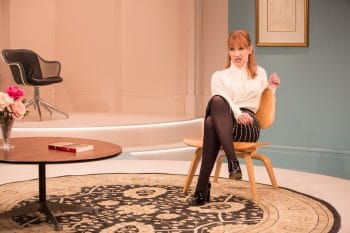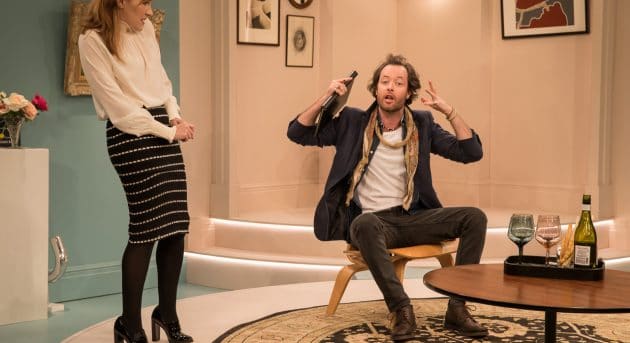The Literati – Bell Shakespeare Co/Griffin Theatre Co
The Literati, the stylistic younger sibling of Justin Fleming’s wildly funny 2014 take on Tartuffe (this one’s based on Moliere’s Les Femmes Savantes), is a Bell Shakespeare-Griffin Theatre collaboration that has been nestled into Griffin’s SBW Stables Theatre.

Les Femmes Savantes, or ‘The Learned Ladies’ is Moliere’s satire of pretentiously cultured cliques – but more specifically, a satire on scholarly women as shallow and pretentious, identifying and glorifying poor work as genius (even though the worst of the lot is a man, we spend more time with the women, watching them literally flail about the stage in awe).
While it’s smart for Fleming to transpose this into a satire of the modern ‘cultural wanker’, and to make the play’s most respected scholar a woman instead of a man (Caroline Brazier wears intellectualism well), it doesn’t change the root of the play from being concerned with a woman’s inability to make the correct decisions.
One half of the plot is all about securing permission from parents for a woman to marry – why Fleming decided to keep this storyline intact is baffling when he took plenty of liberties with the rest of it. The result is a modern work that feels irrelevant, even though the women in the production are brilliant. Miranda Tapsell, as would-be bride Juliet to sweet-but-not-intellectual Clinton (Jamie Oxenbould) has little to do except look beautifully big-eyed (she does double duty as an ‘uneducated maid’ which is supposed to make a point about street smarts but in Fleming’s couplets really just feels sort of exploitive).

The second story is more successful: Amanda (Kate Mulvany) and her mother Philomena (Caroline Brazier) are enchanted by an up-and-coming poet, Tristan Tosser (Gareth Davies). Tosser is a poseur (and a tosser, to embrace the play’s affection for local, if dated, vernacular) but he’s mysterious, brooding, and wearing skinny jeans, hemp bracelets and a scarf, so of course he’s the next big thing.
Amanda, who has chosen celibacy in order to cultivate her mind, is mad for Tosser; Mulvany’s physical comedy as Tosser reads from his latest sonnet is outstanding. Davies looks and acts like he’s walked out of many a Sydney theatre foyer or bespoke bookshop and there’s something wicked about the accuracy of his performance. But when one of the best jokes of the play is when he insists his name is pronounced “Tosseur,” echoing a certain beloved British comedy character, he’s let down by the script.
Like Tartuffe, and in the vein of Moliere, the play is performed in a series of rhyming couplets; unlike Tartuffe, The Literati feels especially burdened by this stylistic decision. Hanging a lampshade on the poor rhymes is fine and funny when there’s only a few clunkers in a sea of enjoyable moments, but in this production there are a few too many; it begins to feel like we’re supposed to laugh at being handed a work that’s rough around the edges; to laugh because we’re listening to a poor, apoetic script.

Lee Lewis directs and there’s something charmingly buoyant to her approach; she has a great intelligence for comedy and the physical moments and character affectations transcend the so-so script and lead to the biggest laughs. Sophie Fletcher’s design is delightfully gaudy (it feels perverse in the tiny SBW Stables Theatre, which is so enjoyable) and features a revolve, of all things – little touches of glee like this help to win over the crowd and draw focus away from the script.
Lewis and her company of actors do an excellent job of elevating the play into something fun and enjoyable; Mulvany, Brazier, Tapsell, Oxenbould and Davies cause ripples of laughter in the audience with a hand in hair or a sideways walk onto the revolve alone, and the audience is clearly having a great time. It’s just not a very robust script and since that is, of course, the core of the play, it never really soars.




